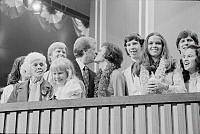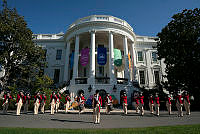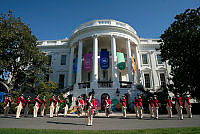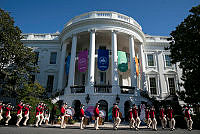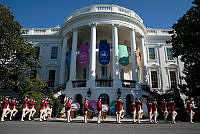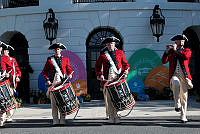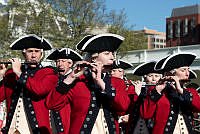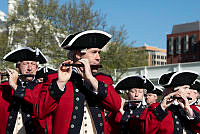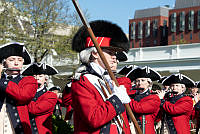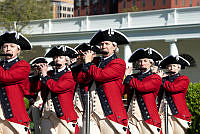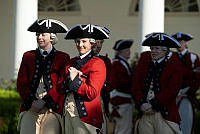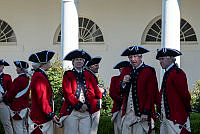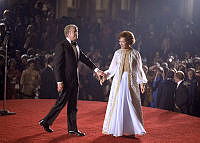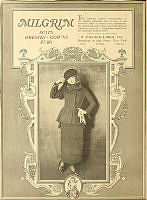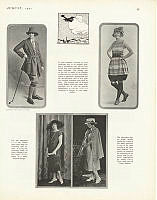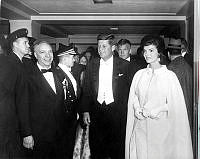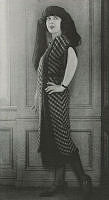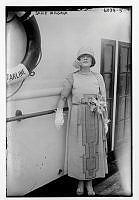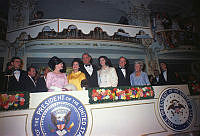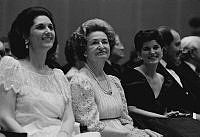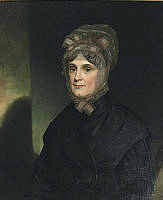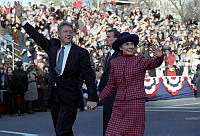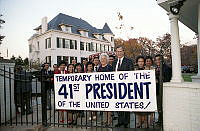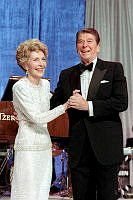Not a Ragged Mob; The Inauguration of 1829
Copyright © White House Historical Association. All rights reserved under international copyright conventions. No part of this article may be reproduced or utilized in any form or by any means, electronic or mechanical, including photocopying, recording, or by any information storage and retrieval system, without permission in writing from the publisher. Requests for reprint permissions should be addressed to books@whha.org
On March 4, 1829, many in the crowd filling the city thought that Providence was smiling on the country in general and on Washington, D.C., in particular, for they believed that the resolute will of the people had swept from office a corrupt administration. The “common man” had come to the capital to revel in the installation of a popular champion as chief executive. Washingtonians, generally, were not so cheerful, deeming the admired champion a backwoods barbarian, his associates cronies, and his followers an uncivilized horde.
Andrew Jackson had accumulated affectionate nicknames in his colorful career, a testament to the way other men regarded him: he was Old Hickory to the sinewy soldiers who had marched with him, the Hero of New Orleans to a country grateful for his defense of that city during the War of 1812, and simply “the Gin’ral” to close friends, family, and the vast number of associates who had seen to his election. After a brief ceremony at the Capitol that March day, at 61 years of age he would also officially be the president of the United States. His enemies winced at the prospect. His followers, however, could hardly contain their glee, and, at least for a time, they did not try. The day’s defining hour, in fact, would not be the unadorned swearing-in at the Capitol. Instead, it would be when “the majesty of the people”1 descended on the presidential “Palace”2 to pay respects to the new president. Jackson’s arrival at the house amplified an already chaotic situation. Renowned visitors greeted him first, but ordinary folk soon rushed forward to shake his hand and offer best wishes.
The surging crowd made mingling impossible, and as people pushed toward Jackson and lunged toward refreshments, they collided with fragile furniture and shoved servants laden with punch bowls and trays of food. Waiters trying to maneuver with a large bowl of spiked orange punch crashed into a crowd and spilled it all on the carpet. Men in work boots, straining to see Jackson, stood on expensive upholstered furniture.3 That such people were even present at so august an event represented the triumph of democracy to some. To others, the much-reported mayhem demonstrated the danger of giving the ungovernable rabble political rights. Both views were exaggerations. Senator James Hamilton of South Carolina, a Jackson supporter, struck a balance when he described the event as a “regular Saturnalia,” but with the qualification that most of the damage was trivial.4 The people had gotten out of hand—Jackson’s opponents thought it an apt evaluation of the election as well as the inaugural reception—but whether they had done no real harm in either instance was a matter of opinion.

Portrait of the seventh president Andrew Jackson portrayed here by Ralph E. W. Earl in about 1835.
His supporters, provoked by the rancorous election of 1824 and angry over the vicious campaign of 1828, saw Jackson’s victory as sweet revenge as well as political vindication. In 1824, the enormously popular Jackson won pluralities though not majorities against three Washington insiders in both the popular vote and the Electoral College. Secretary of State John Quincy Adams came in second, followed by Secretary of Treasury William H. Crawford and Speaker of the House Henry Clay. The absence of a majority in the Electoral College meant the House of Representatives would choose the president from the top three candidates. Considerable uncertainty and unseemly political maneuvering clouded the process, and a Washington wag irreverently compared the matter to a horse race: “Old Hickory led, closely pushed by Yankee, who soon locked him, as they have entered the last quarter has got a half a length a head;—Crawford had been losing for the two last rounds, but by good jockeying has lately gained upon the others—if in coming in he can once lock Yankee, he may jockey him out & give the race to Hickory.”5
The events unfolding in Washington during those first weeks of 1825 were actually even more complex. Jackson later claimed that Clay, through an intermediary, had offered to secure Jackson’s selection by the House, but that Jackson instantly rejected such an arrangement as corrupt.6 Jackson’s operatives, however, were feverishly contriving to fix his victory as the House prepared to vote, and not until Clay offered his support to Adams did the charge of corruption emerge. When Adams won the House vote and the presidency, Jackson’s camp immediately assumed that an unholy alliance between Adams and Clay had blocked the people’s choice. Jackson wrote his close friend and adviser Maj. William B. Lewis that he hoped the rumors about a “Barter of office” were untrue.7 However, when Adams appointed “Harry of the West” secretary of state, the most prestigious cabinet post and widely regarded as the springboard to the presidency, Jackson was convinced that it was payment for Clay’s support in the House. Actually, Clay personally disliked the peppery Adams but found him like-minded regarding the purpose of American government.8
Jackson never publicly uttered any accusations about corruption, but privately he railed that Clay was “the Judas of the West” who “had closed the contract and will receive the thirty pieces of silver.” He asked Lewis: “Was there ever witnessed such a bare faced corruption in any country before?”9 It was a cue for supporters with very loud voices, and what they dubbed the “corrupt bargain” became their rallying cry for the next four years. Clay and Adams, they charged, had engaged in “downright bribery & corruption.”10
In their own minds, Clay and Adams had good reason for their arrangement. Clay candidly wondered why “killing 2500 Englishmen at N. Orleans qualifies for the various, difficult and complicated duties of the Chief Magistracy.” Adams doubtless agreed that Jackson’s election would be “fraught with much danger to the character and security of our institutions.”11 Yet, whether it was “corrupt,” innocent, or fashioned from the most altruistic motives, their bargain amounted to a major political blunder that would haunt them for the rest of their days. Brokered political deals were in disfavor by 1825, as evidenced by the suspicion accorded the congressional caucus that traditionally chose presidential candidates.12
Americans’ attitudes toward elections had changed. The average voter viewed the closed-door process as elitist and demanded more participation at all levels of the election, from the choice of the candidate to the balloting in the contest. Across the nation, states were amending their constitutions to give voters a direct role in choosing presidential electors, something earlier reserved for state legislatures. With their actions in 1825, Adams and Clay disastrously ignored this fundamental change in the American political ethos. For the next four years, Jackson and his supporters incessantly reminded the country of the apostasy. 13
Jackson declared his resolve to prevent “the unprincipled and wicked” from triumphing over him and the American people again.14 His advocates portrayed him as a selfless patriot who repeatedly left his quiet farm to protect the people from savage Indians, duplicitous Spaniards, and invading Britons, only to be cheated out of the presidency for his trouble. Worse, the American people had been deprived of their legitimate choice for the office.15 The Jacksonians forged an angry coalition that extolled local governments and pledged to limit meddling by the national one.
Jackson became the political heir of Thomas Jefferson; Adams and Clay became the reprehensible purveyors of discredited Federalist ideas, promoting central government, restricting state power, raising tariffs, and appointing grasping bankers to control the economy. 16 Worse, Adams and Clay were smeared as crooked characters intent on enhancing their power and padding their pockets. Jackson sniffed that Adams’s inauguration had exhibited a “pomp and ceremony of guns and drums not very consistent in my Humble opinion with the character of the occasion.” Jefferson had needed no such ceremony, he grumbled, choosing even to “ride his own horse” rather than a stately carriage.17 (In fact, Jefferson had walked to his inauguration.)
The charges about pompous behavior were unfair, but Adams with his New England reticence and penchant for formality was an easy target. In fact, Adams was no more inclined to pageantry than were previous presidents. His years in diplomatic service had exposed him to the exacting protocols of European courts, and he entertained appropriately for a head of state. His wife Louisa Catherine, a retiring woman who dreaded her duties as first lady, nevertheless worked hard to restore the social aspect of the presidency that had been injured by the reserve of her predecessor, the somewhat remote Elizabeth Monroe.18 Yet, the man the Jacksonians derisively called “Johnny Q”19 staggered through his presidency as if in a bad dream while Jackson’s political operatives did everything in their power to destroy him. Because active campaigning by candidates was regarded as unseemly, Jackson remained at the Hermitage, his home in Tennessee, following the progress of his cause, reading dozens of newspapers from all over the country, and receiving reports from countless correspondents. Meanwhile, dinners held in his honor, tumultuous rallies, and raucous parades encouraged his candidacy.20

Portrait of the sixth president John Quincy Adams portrayed here by George P. A. Healy in 1858.
WHITE HOUSE COLLECTIONThus primed, both sides waged an incredibly dirty campaign in 1828. Adams was portrayed as extravagant and corrupt; Jackson was denounced as an American Caesar. Worst of all, the dubious circumstances of Jackson’s marriage were widely broadcast.21 His legendary temper was depicted as his defining characteristic. He had fought duels, killing prominent Nashville attorney Charles Dickinson in one for insulting his wife. He had brawled in the streets of Nashville, had threatened to cut off senators’ ears, and had executed militiamen under his command. The Adams camp hoped these stories would both persuade the people that Jackson was unsuitable and provoke him to additional outbursts that would bolster the impression. With difficulty, Jackson’s handlers persuaded him to hold his temper. The people tended to ignore the charges or turned angrily on those who leveled them.22
Some historians have attributed Jackson’s landslide victory in 1828 to the passions generated by personalities rather than issues, but the behavior of both sides challenges that interpretation. Jackson’s supporters really did see his victory as the defeat of special privilege and corruption, in Jackson’s words a “triumph of the great principle of self government over the intriguers of aristocracy.”23 His opponents were equally conceptual regarding their view of the matter and were as crestfallen as the Jacksonians were jubilant. “Nothing has ever heretofore occurred to create in my mind such awful apprehensions of the permanency of our liberty,” said Henry Clay. Jackson’s victory, he said, was a “calamity.”24 The stage was ominously set for one of the most pivotal inaugurations in the history of the republic.
Jackson was the first president-elect since George Washington to be absent from the capital when elected, and because the Senate would not count and certify the returns until the second Wednesday of February, waiting for a delegation to summon him would make him late for his own inauguration.25 Numerous requests to pause in every town between Nashville and Washington would, if honored, lengthen his journey.26 His supporters not only urged him to hurry to Washington but also ominously suggested that given the angry mood of his opponents, extra precautions for his safety were in order.27
As Jackson prepared to leave for Washington, however, his entire world literally collapsed with the sudden death of his wife Rachel. During a shopping trip to Nashville, she had learned of the worst of the accusations made about her during the campaign, scurrilous attacks Jackson had labored to keep from her. Only a few days later, she suffered a massive heart attack, and on the night of December 22, 1828, her kind heart finally gave out.28 Jackson was inconsolable and barely able to face his impending journey, let alone contemplate his looming responsibilities. His devastating loss cast a shadow over the trip to Washington and everything that happened for weeks afterward.29
Jackson boarded the steamboat Pennsylvania on Monday, January 19, 1829.30 The boat sported two hickory brooms—a symbol for Jackson’s plans to sweep corruption out of Washington—and everywhere exultant crowds greeted his arrival. At Pittsburgh, a shoving mob nearly crushed him as men scrambled to shake his hand. Obliging them exhausted him.31 His health was bad and his mood somber. Dressed in mourning black, including a black armband and trailing black band called a “weeper” around his beaver hat, Jackson resembled a gaunt crow. He grimly frowned on celebrations made unseemly in his view by his beloved Rachel’s recent death. Nearing Washington, he insisted that no formal escort accompany him into the capital.32 Instead, he entered the city in “a plain carriage drawn by two horses followed by a single black servant.”33
Installed in John Gadsby’s new, luxurious National Hotel, Jackson occupied a suite dubbed the “Wigwam,” where he consulted with advisers. He began receiving hundreds of office seekers, the first wave of the enormous crowds to come. Many among those thousands who made this inauguration so memorable came looking for federal jobs as well. Not since Thomas Jefferson’s self-proclaimed “Revolution of 1800” had there been such a dramatic change in the philosophy of governance. Many job hunters, expecting an equally dramatic change in the personnel of government, circled Jackson like predators, establishing a custom that would be the bane of incoming presidents for the rest of the century. 34

President Andrew Jackson on horseback with another horse in tow is seen arriving at the White House in 1829.
LIBRARY OF CONGRESSIn 1829, Washington society as well as existing federal officeholders watched the mounting spectacle with uneasiness. Here, after all, was tangible evidence of the profound social, political, and economic changes sweeping the country, and the Washington establishment surveyed the potential for radical change with considerable anxiety. Although much of the country now relied on Jackson to protect ordinary citizens’ best interests, others predicted a presidency ruinous to the nation. To them a man like Adams and a strong central government were the best guarantors of stability as well as prosperity. Persistent questions about what was to come contributed to a discomfiting uncertainty. Jackson remained silent about his plans.35 Jackson did choose his cabinet, but his selections, with the exception of Martin Van Buren as secretary of state, inspired little confidence. Even supporters gauged the group as an assemblage of mediocrities. Jackson’s most notorious selection was his old friend John Eaton for the War Department. Eaton was not qualified for the post, and his new wife Margaret, the beautiful daughter of a Washington innkeeper, was the subject of considerable gossip. Margaret’s first husband had only recently died at sea, a possible suicide, when Eaton married her on New Year’s Day 1829 amid rumors that they had been carrying on an affair. Foreshadowing its explosion into the “Peggy Eaton Affair,”36 a scandal that dominated the first two years of Jackson’s presidency, Washington society’s criticism of Margaret was a blemish on the inauguration. Jacksonians bristled at what they considered an indirect attack on the president-elect, but Washingtonians saw Jackson’s cabinet as underscoring his lack of judgment and his appointment of Eaton as confirming his lack of couth.37 Unfortunately, not only the inaugural reception on March 4, 1829, but also some events leading up to the day reinforced those assessments.
Most telling was Jackson’s treatment of John Quincy Adams. Although Jackson especially held Clay responsible for the ugly press attacks on Rachel during the campaign, he did not regard Adams as blameless. Moreover, Jackson was convinced that Rachel’s discovery of these reports had contributed to her death. Understandably bitter, he refused to pay a courtesy call on Adams during the three weeks before the inauguration. Adams rightly saw Jackson’s behavior as a deliberate snub and refused to attend the inauguration, something of an Adams tradition: his father had similarly slighted Jefferson after the rancorous campaign of 1800.38 As the inauguration approached, the two men at most exchanged coldly civil notes. Adams offered to vacate the White House so Jackson could entertain there; Jackson replied that Adams should not inconvenience himself. Adams left the White House on the evening of March 3.
Adams was not missed at the ceremony, certainly not by the thousands who had assembled in Washington, some even borrowing money to make the trip. With every room in and around the city occupied, many people were without bed or board, and pickpockets worked to deprive them of their cash. “I kept my purse in my pantaloons pocket with my hand generally on it,” one careful spectator noted.39 Lucky for everybody, March 4 dawned clear and warm. A 13-gun salute signaled the start of festivities as people filled the streets, particularly Pennsylvania Avenue, an unpaved thoroughfare divided by a median of poplar trees. Crowds shifted back and forth seeking the best vantage for a glimpse of Old Hickory.40
Jackson emerged from his hotel at 11:00 a.m. Preceded by a guard of veterans from the Revolutionary War and the battle of New Orleans, Jackson walked to the Capitol accompanied by his nephew Andrew Jackson Donelson and Major Lewis.41 The stroll was more than symbolic of simple republicanism, emulating as it did Jefferson’s gesture of 28 years earlier. It was Jackson’s personal statement of physical fortitude, the triumph of an iron will over a failing body. Jackson did not wear a hat, and Washington social maven Margaret Bayard Smith described its absence as befitting “the Servant in the presence of his Sovereign, the People.”42 The crowd flocked to him, marking his progress like a great, turbulent wave. A multitude awaited him at the Capitol, equally animated and overwhelming in its growing size. Francis Scott Key, no stranger to moving patriotic scenes, as his “Star-Spangled Banner” attests, was left almost speechless by this one. “It is beautiful,” he exclaimed, “it is sublime!”43
Jackson disappeared into the Capitol to witness the installation of Vice President John C. Calhoun. After that brief ceremony, he followed a procession of Supreme Court justices and marshals to the East Portico. As the mass of people caught sight of him, more than ten thousand “living beings, not a ragged mob, but well dressed and well behaved respectable and worthy citizens,”44 erupted into a deafening roar so intense that the sound itself had a physical presence.
A groaning ship’s cable strung across the Capitol steps restrained the crowd as Jackson stepped forward and bowed. The muffled report of a 24-gun salute fired at the Navy Yard mingled with a lively rendition of the “President’s March.” With long, gnarled fingers, Jackson pushed his regular spectacles to the top of his forehead and donned his reading glasses. He took his inaugural address out of his pocket and read to the crowd a speech that contained no promises except the pledge to do his best for the people. Chief Justice John Marshall administered the oath of office, and the new president kissed the Bible. He again bowed to the crowd, triggering a prolonged cacophony of throaty cheers, whistles, and applause that grew more intense as the ship’s cable snapped and the throng surged up the steps toward him. His entourage hurried him back into the Capitol and ushered him out the west side of the building. There Jackson mounted a large white horse and rode to the White House through the churning crowd for the postinaugural reception.45 The people’s display of emotion stunned cynical Washington. The depth of feeling for Jackson and what he represented was perplexing. Senator Daniel Webster remarked, “Persons have come five hundred miles to see General Jackson, and they really seem to think that the country is rescued from some dreadful danger.”46

A print by Robert Cruikshank entitled “President’s Levee or All Creation Going to the White-house, Washington” shows the crowd at President Jackson’s reception.
White House CollectionThe balance of the day, however, would replace bewilderment with alarm and restore for sophisticates a comforting cynicism. Washington elites who regularly attended receptions and dinners at the White House assumed that President Jackson’s postinaugural party would be the usual crowded but genteel affair. Yet finely dressed ladies and gentlemen arriving at the Executive Mansion were shocked. Hordes of people dressed in homespun and calico were at the White House acting like invited guests. They had not come to Washington merely to watch the inauguration; they had come to celebrate Andrew Jackson, the man who had saved their country at New Orleans and would now save their government at Washington. Such large numbers caught the White House steward and servants unprepared. Just as the house was not large enough to accommodate the unexpected multitude, Washington society was not discerning enough to understand the ordinary people who composed it. So it went with its noisy hubbub, fractured manners, spilled punch, and at least one comic scene in which a Georgia congressman and his wife escaped the clamor by climbing out a window.47 Too many people in too small a space contributed to an incipient panic, and as the crowd pressed toward Old Hickory to shake his hand, friends worried about his safety. Jackson, exhausted and pale, was trapped against a wall before being shuffled out of the house and back to the National Hotel for his dinner. Finally, Antoine Michel Giusta, Adams’s and now Jackson’s steward, dispatched large tubs of whiskey punch outside to draw the crowd to the lawn and restore order in the house.48
Even those impressed by the unfeigned affection of the thousands cheering Jackson at his inauguration felt violated by this “reign of King MOB” at what they considered their social preserve.49 As the long lines had continued to enter the White House, Margaret Bayard Smith found disquieting how quickly “the Majesty of the People had disappeared” to be replaced by “a rabble, a mob.”50 Indeed, Jackson’s enemies seized on the havoc at the White House so avidly that the reception became the most memorable part of the inauguration, complete with colorful exaggerations about the temperament of the crowd and its alleged penchant for thoughtless vandalism. Most witnesses, however, mentioned little real damage, and newspapers reported only incidental breakage. Niles’ Weekly Register, in fact, merely observed that Jackson had “received the salutations of a vast number of persons, who came to congratulate him upon his induction to the presidency.”51
The anti-Jackson Washington City Chronicle blandly commented that “the President’s hospitality on this occasion was in some measure misapplied” and blamed marshals for not barring the potentially unruly.52 “The Sovereign People were a little uproarious, indeed,” reported the Washington Daily National Intelligencer, “but it was in any thing but a malicious spirit.”53 And true enough, some had come for free food and to gawk at the grand house, but most had gathered to see Andrew Jackson, celebrating, as Margaret Bayard Smith said, “the People’s day, and the People’s President,” asserting the new reality that “the People would rule.”54
That reality, though, was the very thing that troubled the established political class. Broadening democracy—in the eyes of the establishment, the political faith of the unruly and ungovernable—had placed Jackson in the presidency. It had also put his rowdy supporters in the White House, at least for an afternoon. Those who objected did not wish the people ill; they simply felt themselves better equipped to govern the country, just as they felt themselves better suited to attend its fine receptions. The people’s place was to accept the wisdom of their betters and, most of all, keep in their place. That attitude’s obsolescence was glaringly revealed in the deafening cheers of the thousands on Capitol Hill that March day, and in the broken china and soiled carpets of the White House that afternoon. Harrumphing gentlemen in tailored suits and beaver hats and their fainting ladies in fine silks and rustling petticoats saw the future that day. They did not like it.













